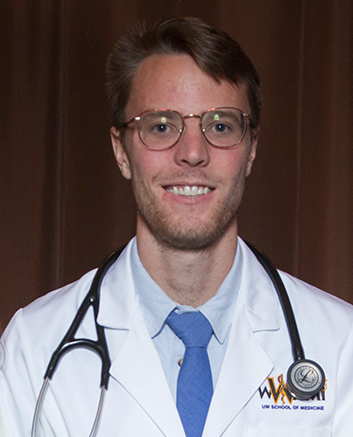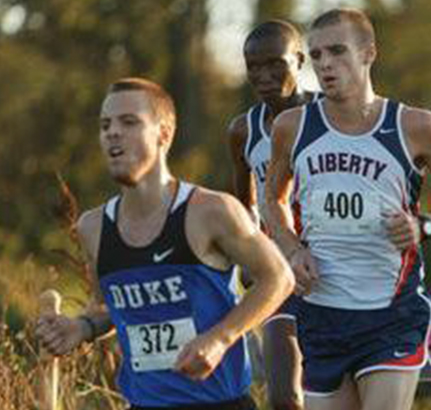
“I’m going into anesthesiology intending to be an ICU doctor. My ultimate goal? To split my time between the operating room and the intensive care unit in a rural area in Wyoming.”

“I’m going into anesthesiology intending to be an ICU doctor. My ultimate goal? To split my time between the operating room and the intensive care unit in a rural area in Wyoming.”
A fourth-year medical student in the University of Washington School of Medicine’s WWAMI program, Spencer Pecha has sought out training to prepare for a career in the places where he is needed most: rural communities in his home state of Wyoming.
“I’m going into anesthesiology intending to be an ICU doctor,” says Pecha. “My ultimate goal? To split my time between the operating room and the intensive care unit in a rural area in Wyoming.” Now choosing a residency, he’s well on his way to achieving his vision.
Pecha is no stranger to setting goals and meeting challenges head-on. As a Division 1 cross-country runner and track and field athlete during his undergraduate years at Duke University and a self-described “obsessive rock climber,” he has experience pushing himself, testing his limits and being part of a team.
He also has a deep connection to, and understanding of, rural communities. Pecha grew up in Gillette, Wyoming, a small town centered around natural resource extraction. “My dad is in the oil and gas industry, and my friends are at the coal mines or in the oil fields,” he says. “I became intrigued with thinking about how people’s health could be affected by the environmental, social and economic conditions of their lives.”
“These observations drew me into medicine,” he says
Pecha’s experiences growing up in Gillette shaped him in many ways. “There’s an expectation in the community that you work hard,” he says. That extended to the town’s distance running program, which has a history of producing top-notch athletes. “Being around that environment developed a strong work ethic in me. I enjoy working to improve,” he says. “There’s always something to learn.”
This attitude extends to Pecha’s volunteer efforts. “I did a project during my first and second year of medical school in Douglas, Wyoming, with the Converse County Sheriff’s Office and the Wyoming Department of Health. Distributing gun locks to improve gun storage and solve a problem was fulfilling,” he says. “Every time I volunteer or get involved with a community organization, it feels good. I’m fulfilling that desire in myself to give back.”
Medical school has also offered plenty of challenges and opportunities to grow — including an unexpected global pandemic. “During my third year, we were taken out of clinical rotations from mid-March until the end of June,” he says. Many in-person lessons moved to Zoom, and he’s done residency interviews online as well, without the ability to get a sense of the cities or programs where he may be living and learning. For Pecha and his classmates, it’s a challenge they never anticipated when planning the next steps in their careers.

“Being around that environment developed a strong work ethic in me. I enjoy working to improve,” he says. “There’s always something to learn.”
"You apply to the program and get paired with a small community... It's an amazing program that allows you to have a longitudinal connection to one community, where you do lots of clinical training. It's such a great thing for donors to fund."
Fortunately, Pecha has found a strong support system at the School. “Meeting other medical students has been super fulfilling, getting to know them and getting to experience different hospitals around the region,” he says. As a Wyoming resident, he also benefits from a state program that pays for a significant portion of his tuition; in return, he’ll practice in Wyoming for three years after he gets his degree.
“I’ve always wanted to do that,” he says of the program. “It’s essential to have those pipeline programs to bring young physicians back.”
Another effort, the Targeted Rural Underserved Track (TRUST) program, helps prepare Pecha and other students for a career in rural healthcare. “You apply to the program and get paired with a small community,” he says. “It’s an amazing program that allows you to have a longitudinal connection to one community, where you do lots of clinical training. It’s such a great thing for donors to fund.”
Together, the WWAMI program, home-state support and TRUST program help Pecha on his journey to do the work he’s passionate about: taking care of some of the sickest patients and supporting people in rural communities to reach their goal of a good life up until the very end.
Some years ago, after reading the book “Being Mortal” by Atul Gawande, Pecha signed up to volunteer with Gillette’s hospice organization. There, he spent time with sick people at the end of life and began to imagine someday having the skills to offer patients pain relief and choices. His training as an anesthesiologist sets him up to do this.
“The message of the book — of optimizing patients’ quality of life at the end of life — inspired me,” he says. When medicine sometimes keeps patients alive at all costs, Pecha wants to focus on what his patients want and need.
“One of the reasons critical care and intensive care medicine attract me is because you have to have those conversations. What are their goals? If they are very sick, how does the end of life look? They can be challenging situations to navigate, but they are also fulfilling.”
Pecha knows this type of care requires personal connection and unflagging endurance — qualities he’s honed throughout his journey from growing up in Gillette to training to be a physician in such unusual times. Now, as he prepares for his residency, Pecha is ready to use those skills to care for Wyoming’s resilient rural communities.

Written by Alice Skipton
If you’d like to help medical students like Spencer care for the rural communities they call home, make a gift to support scholarships at UW Medicine.
Your generous year-end gift to UW Medicine means more than ever — powering life-changing medical research, education and care for our region and for our world. Will you make your tax-deductible gift by Dec. 31?